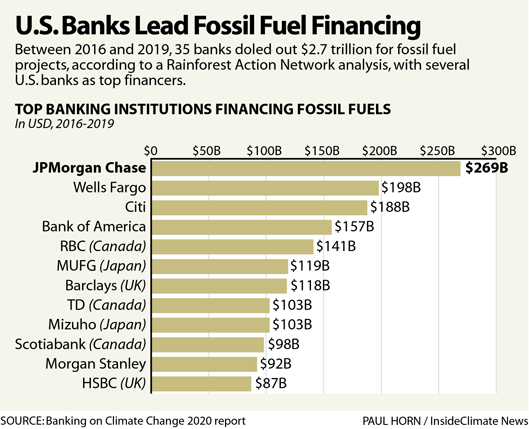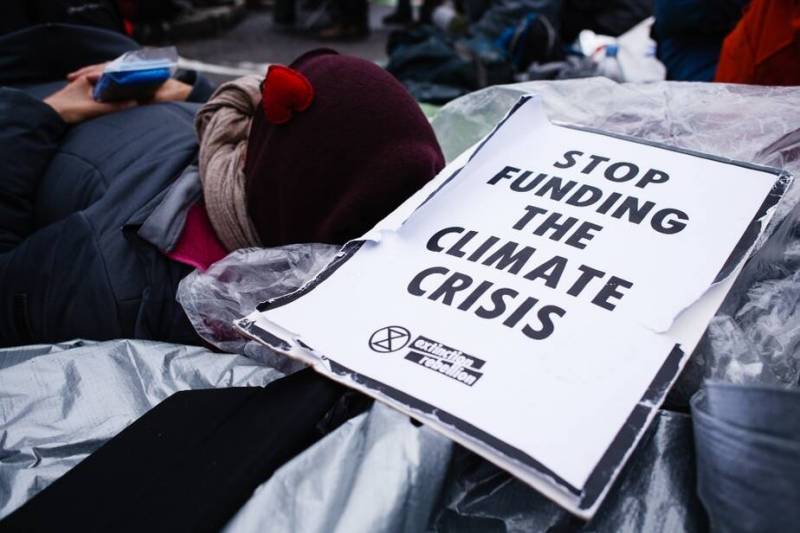But the pandemic hasn’t dissuaded investors from acting on climate change. And many analysts argue that the economic disaster caused by the virus has helped galvanize money managers — who now see climate change as the next global financial crisis — to more urgently protect their assets by transitioning away from high-carbon industries.
Since February, some of the world’s largest financial institutions have stopped putting their money behind oil and gas drilling in the Arctic, or into Canada’s particularly dirty tar sands operations. Investment funds geared toward either excluding the fossil fuel industry entirely, or underweighting high-carbon companies in their mix, have exploded with record cash inflows, despite the market turmoil.
In July, several top U.S. banks funded the launch of a massive new climate initiative aimed at spurring a quicker transition to a low-carbon economy, with Goldman Sachs pledging $750 billion through 2030 to address climate change in its operations, investments and financing. Morgan Stanley, too, made headlines when it announced, later that month, that it would become the first major U.S. bank to disclose how all of its investments and loans were contributing to global warming.
“The kind of change we’ve seen over the past six months indicates, in a new way, how important this issue is,” said Kirsten Spalding, senior program director for the advocacy investor group Ceres. “If this could happen with one virus, what are we waiting for in terms of climate change?”
Environmentalists Say Banks’ Pledges Are Good, But Only a Start
Morgan Stanley’s decision to disclose how its investments contribute to climate change is comparable to “admitting you’ve got a problem,” said longtime analyst Lila Holzman.
Holzman, who manages the energy program for the prominent advocacy investment group As You Sow, has for years been pressuring banks like Morgan Stanley to disclose their financials in regard to global warming, but to no avail. “Now,” she said, “the institutions themselves are going to, in a sense, come clean.”
Still, environmentalists say that Morgan Stanley’s pledge, the latest in a slew of pledges from banks over the last six months, is only a start. Admitting you have a problem is a good first step, Holzman said, but there is still a lot more work ahead, including setting specific targets to phase out companies with heavy carbon emissions from portfolios and creating detailed plans for how to do that.
The reality is that even with recent pledges from banks to withdraw financial support from certain areas of fossil fuel development — mainly coal, Arctic drilling and oil sands projects — money managers are still bankrolling new fossil fuel development elsewhere.
Between 2016 and 2019, 35 banks doled out $2.7 trillion for fossil fuel projects, according to the environmental group Rainforest Action Network. Several U.S. banks accounted for a good chunk of that funding, with JPMorgan Chase having supplied $269 billion and Morgan Stanley having given $92 billion.
Holzman said that’s exactly why banks should be more transparent about the impact and risks of their investments regarding climate change. If investors want to avoid funds that they believe exacerbate climate change, or puts their assets at risk from its effects, they currently don’t have good information to help them make that decision, she said.

Holzman said that’s exactly why banks should be more transparent about the impact and risks of their investments regarding climate change. If investors want to avoid funds that they believe exacerbate climate change, or puts their assets at risk from its effects, they currently don’t have good information to help them make that decision, she said.
Both Holzman and Ceres’ Spalding hope Morgan Stanley’s decision will encourage other banks to voluntarily disclose their own finances in relation to climate change. They both expect governments to implement laws that would require banks to do so in the coming decades — although those regulations will likely be passed in Europe long before being adopted in the United States.
Banks and other asset managers have terrible track records in adopting measures to increase their transparency regarding climate-related risks to their finances. The boards of both BlackRock and Vanguard — another major investment firm — have voted overwhelmingly against shareholder resolutions meant to address global warming, including those requiring asset managers to disclose climate-related risks, according to a report from the shareholder advocacy group Majority Action.
But analysts say banks are starting to come around when it comes to climate-related resolutions. In May, the board of JPMorgan Chase voted to remove former ExxonMobil CEO Lee Raymond as the board’s lead independent director, amid pressure from climate activists. And in June, at the behest of European bank BNP Paribas, Chevron’s board voted for the first time ever to align the oil giant with the Paris climate accord.
“They’ve really come a long way to recognize their role in contributing to climate change,” Holzman said.
’Social Good’ Funds Growing Fast, But a Trump Proposal Could Stifle Them
Growing investor demand to address climate change has also spurred an explosion in so-called ESG funds — investment funds that attempt to do “social good,” by taking environmental, societal and corporate governance factors into account, rather than looking at financials alone.
Last year, there were a staggering 37,000 index funds worldwide that tracked companies according to their ESG risk and performance profiles, Reuters reported. That’s a 60% increase from a year earlier, with ESG indexes being the fastest growing segment of the market. And so far this year, ESG funds have seen a record inflow of cash — more than $45 billion — despite the pandemic, with U.S. funds exceeding $10 billion, according to a report from CNBC.
But a Trump administration proposal, if finalized, could slow that growth by making it harder for pension plans to invest their money into such funds. In June, the Department of Labor proposed amendments to the investment duties regulation under the Employee Retirement Income Security Act, which if enacted, would reaffirm that fiduciaries must select investments based solely on monetary return factors.
The proposal drew quick ire from advocacy and financial groups, including several state treasurers, who argued that taking climate change into account is a monetary factor. “The DOL proposal ignores the fact that funds that use ESG considerations have outperformed the market,” wrote Illinois State Treasurer Michael Frerichs in a press release. “As a fiduciary I believe it is my duty to consider material and systemic risks like those posed by the climate crisis, water scarcity and ineffective human capital management.”
ESG funds aren’t without their faults, and most agree a green economy alone won’t solve the climate crisis. As a nascent market, ESG funds lack cohesive guidelines and methodologies for how to measure, report and enforce their environmental impact, said Gita Rao, a professor of finance at the MIT Sloan School of Management and a longtime investment consultant.
“Part of the problem is we don’t have a set criteria,” Rao said. “We don’t have something that says, ‘If you are truly ESG, you should not be holding X, Y and Z.'”
That ambiguity has allowed some funds to “greenwash,” she said, by claiming to be ESG while still holding companies with heavy carbon emissions. One BlackRock ESG index, for example, held a significant share of ExxonMobil back in January.
There has been some progress on that front, and several groups have emerged to help banks standardize how they track, report and enforce ESG metrics in their portfolios. In July, Morgan Stanley joined one of those groups, the Partnership for Carbon Accounting Financials. Several other banks, including Wells Fargo, Goldman Sachs, Bank of America and JPMorgan Chase, joined the Rocky Mountain Institute’s Center for Climate-Aligned Finance.
While there are still issues to work out, ESG funds are still an effective way to transition to a cleaner economy, Rao said, especially if investor interest continues to grow.


